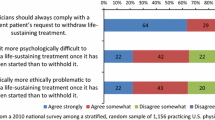Abstract
In matters of discontinuation of life-sustaining treatment, traditional role of the family to speak on behalf of the incompetent patient is questionable. We explore the reasons why physicians perceive patient autonomy to be transferrable to family members. Principle of patient autonomy may not suffice when futile treatment is demanded and may serve to erode the ethical integrity of medical profession. An enhanced role for bioethics committees is proposed when physicians propose to discontinue life-sustaining treatment against the wishes of the patient or their families.
Similar content being viewed by others
References
Ramsey, P. (1978).In the matter of Quinlan-Ethics at Edges of Life. New Haven: EL University Press.
de Tocqueville, A. (1945).Democracy in America. A. Knopf.
Berrigan, D. (1973).We die before we live-Talking with the very ill. New York: The Seabury Press.
Miles, S. (1983). Paternalism, family duties and My Aunt Maude.Journal American Medical Association, 250, 2011–2015.
Kass, L. R. (1980). Ethical dilemmas in the care of the ill: What is the physician's service?Journal American Medical Association, 244, 1811–1818.
Clements, C. D., & Sider, R. (1983). Medical ethics assault upon medical values.Journal American Medical Association, 250, 2011–2015.
Brennan, T. A. (1986). Do not resuscitate orders for the incompetent patient in absence of family consent.Law and Health Care, 14, 13–19.
Blackhall, L. J. (1987). Must we always use CPR?New England Journal of Medicine, 313, 1281–1285.
Jennings, B., Callahan, D., & Caplan, A. L. (1988). Ethical challenges of chronic illness.Hastings Center Report, Feb–Mar.
President's Commission for the study of ethical problems in medicine and biomedical and behavior research. (1983).Deciding to forego life sustaining treatment. Washington, DC: U.S. Government Printing Office.
Veatch, R. M. (1986). Defining the family's role in treatment decisions.Health Progress, October, 50–52.
Weil, M. H., Weil, C. J., & Rackow, E. C. (1988). Guide to ethical decision-making for the critically ill: The three R's and Q.C.Critical Care Medicine, 16, 636–641.
Wikler, D. (1988). Not dead, not dying? Ethical categories and persistent vegetative state.Hastings Center Report, 18, 41–47.
Kyff, J., Puri, V. K., Raheja, R., & Ireland, T. (1987). Cardiopulmonary resuscitation in hospitalized patients: Continuing problems of decision-making.Critical Care Medicine, 15, 41–43.
Callahan, D. (1987)Setting Limits-Medical goals in aging society. New York: Simon and Shuster.
Jonsen, A. R., Sigler, M., & Winslade, W. J. (1982).Clinical Ethics. New York: McMillan Publishing Company.
Tomlinson, R., & Brody, H. (1987). Ethics and communication in Do Not Resuscitate Orders.New England Journal Medicine, 318, 43–46.
Guidelines on the termination of life-sustaining treatment and the care of the dying (1987). Indiana University Press: The Hastings Center.
Brody, B. A. (1988). Ethical questions raised by the persistent vegetative patient.Hastings Center Report, 18, 33–37.
Cassel, E. J. (1986). Autonomy in the intensive care unit: The refusal of treatment.Critical Care Clinics, 2, 27–40.
Brennan, T. A. (1988). Ethics committees and decisions to limit care. The experience at Massachusetts General Hospital.Journal American Medical Association, 260, 803–807.
Lo, B. (1987). Behind closed doors: Promises and pitfalls of ethics committees.New England Journal Medicine, 317, 46–50.
Sundram, C. J. (1988). Informed consent for major medical treatment of mentally disabled people-A new approach.New England Journal Medicine, 318, 1368–73.
Author information
Authors and Affiliations
Rights and permissions
About this article
Cite this article
Puri, V.K., Weber, L.J. Limiting the role of the family in discontinuation of life sustaining treatment. J Med Hum 11, 91–98 (1990). https://doi.org/10.1007/BF01650689
Issue Date:
DOI: https://doi.org/10.1007/BF01650689




